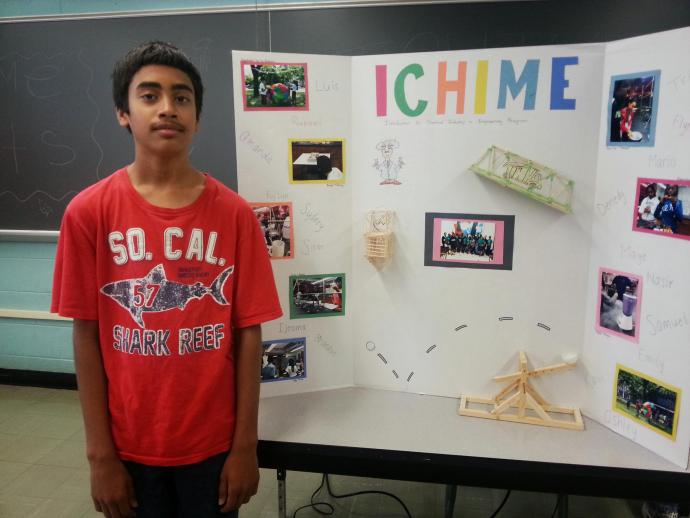For NJIT's Sam Carlos, Two Majors Weren't Enough, So He Made it Three
New students often matriculate at NJIT with a handful of college credits, declaring themselves double majors or participating in joint bachelors-masters programs, but Metuchen's Samuel Carlos is raising the bar, having arrived in 2018 with an astonishing 103 college credits and an associate's degree earned in high school, promptly declaring a double major and then adding a third in 2019 because he didn't want to graduate too soon.
By doing so, Carlos became the first documented Highlander triple-major in the last 38 years since the Banner registration system began, and probably the university's first ever.
Carlos' first two majors are computer science and applied mathematics. Those are a formal combination in the university catalog, leading to a bachelor of science degree. There are 16 current students pursuing that option. Carlos took a history of computing elective and then a humanities seminar in the history of artificial intelligence, and liked those courses so much that he decided to also pursue a bachelor of arts degree in history.
"I didn't want to be just looking at equations and algorithms all day," Carlos said. "I distinctly remember when I was filling out the form there was only one line for the adviser to sign. We sort of modified the form," he said, crediting Albert Dorman Honors College Dean Louis Hamilton with encouraging him to slow down and enjoy the experience.
Like many students, especially his peers in the Honors College, Carlos takes 15 or 18 credits per semester. He is interning at Facebook after already scoring sought-after internships at Google, Prudential, TD Ameritrade and financial technology startup PrivCo. But unlike other over-achievers, Carlos described himself as "lazy" and confessed to sometimes doing homework for one class while attending another.
Still not satisfied, Carlos is trying to finish a business minor and hopes to study in China next spring. Outside of classes, he's a runner who said the exercise helps clear his head. He competes in the International Collegiate Programming Contest, where his team will challenge for a shot at the national level on April 22. Dating is out of the question — "I don't have time for that," he said.
How many credits does he have now? "I just say I'm a junior … I've sort of lost track," Carlos said. "My parents thought I was crazy."
Not quite. His mother, Roweena Carlos, and her husband both work in the computing field. They were born in India. She emigrated to New Jersey in 1997. Roweena joined NJIT in 2015 and is now executive director for academic information systems. But starting in 2013, she enrolled Sam in the Center for Pre-College Programs and its Introduction to Chemical, Industrial and Mechanical Engineering summer sessions, followed by their medical robotics sessions in 2014.
"He multitasks and uses his time. He would read a dictionary on the school bus coming home," she said.
Carlos attended high school at Middlesex County Academy for Science, Mathematics and Engineering Technologies, located on the campus of Middlesex College in Edison. Students there are encouraged to take courses toward associate degrees. Guidance counselor Richard Fernandez said only one other student completed a full A.S. degree since the school opened in 2000. Carlos, beyond that degree in mathematics, ran out of classes to take there after his sophomore year and enrolled as a non-matriculated student at NJIT for the course variety.University registrar Jerry Trombella, in confirming no other documented instances of another triple-major here, said that technically a student can have as many majors as desired, as long as they maintain grade-point average requirements. But he personally knows the challenges of doing so — he was a triple-major in college, too. Trombella studied classics, history and political science at State University of New York / Binghamton, graduating in 1985. He recalled sleeping just four hours per night and said he can't imagine having achieved the feat with technical courses.
Ying Wu College of Computing adviser Tony Angelella said he initially thought Carlos was a transfer student when he saw the number of credits and the associate degree. So, when Carlos inquired about adding a third major, "It wasn't really that far-fetched to me … I didn't see anything wrong with it," he noted. "When students come to me with these different ideas, I say that's great, ultimately though you have to decide whether this is worth extra semesters of work after four years" — or before their four years, in Carlos' case.
"Nobody needs a triple major, but it's fine to do it and you'll learn a lot more that way. I think it's more common at liberal arts institutions and you can find more double-dipping to help with that," Angelella said. "He's driven, proactive and he meets with me every semester. Essentially he already knows what he's doing and what courses he needs to take. He just runs it by me. It makes my job easy."
Student senate president Anuj Patel said he doesn't know Carlos but supports the idea of triple-majoring, as long as a student understands the deep commitment that it would require. "I give him a pat on the back, good luck. Majoring in one thing is hard enough as it is," he said. Patel, also an Honors College student, studies mechanical engineering.
"Different majors have different types of thinking and learning. It opens up so many possibilities," Patel noted. "If they have the academic curiosity, the curiosity in life to learn three topics, I think I would more than encourage them to do so."


